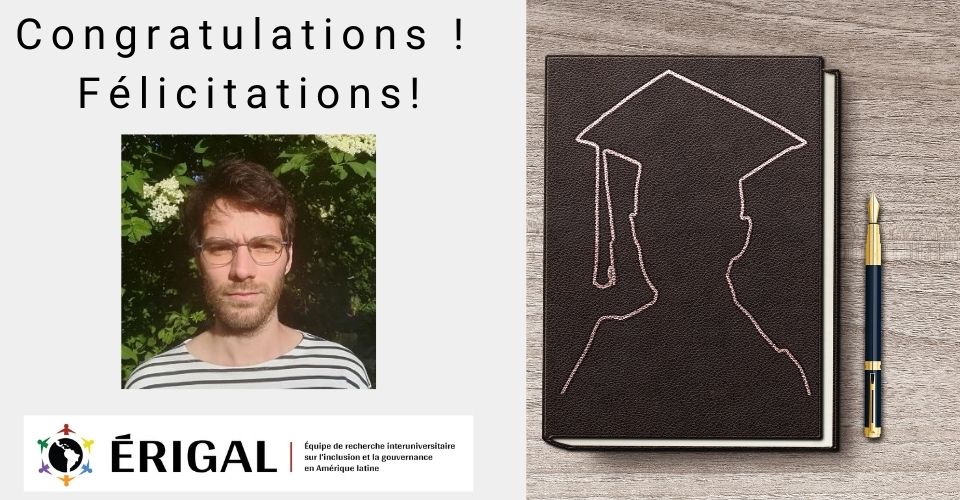Romain Busnel, member of ÉRIGAL, successfully defends his doctoral thesis!

On this Wednesday, November 18, 2020, Romain Busnel, member of ÉRIGAL, successfully defended his thesis and obtained the exceptional mention. Congratulations!
The jury was composed of:
Françoise Montambeault, Université de Montréal, co-supervisor
Camille Goirand, University of Paris 3, thesis co-supervisor
Gilles Favarel-Garrigues, CNRS-CERI, rapporteur
Jean-Pierre Olivier de Sardan, EHESS, rapporteur
Yves Buchet de Neuilly, University of Paris 1, professor
Jacobo Grajales, University of Lille, president
The thesis is entitled "The Art of Seizing the State: The defense of coca crops in Peru and Bolivia" and here is a summary of it:
The coca growing regions of Bolivia and Peru have been a focal point of drug control policies in these two countries since the 1970s. These regions are often portrayed as being subject to a weak, failed or even absent state, and under the control of criminal groups. Focusing on the Tropic of Cochabamba (Bolivia) and VRAEM (Peru) regions, the main national hotbeds of coca mostly destined for illicit markets, this research challenges this idea by showing that not only is the State present, but that it is also maintained and seized by rural coca-producing organizations.
Based on an ethnographic survey, I study from the ground and in a comparative perspective the interplay between the illicit economy, social movements and the State itself. I show how agricultural and trade union federations use coca to build communal government practices, regional identities and frameworks to mobilize and obtain development policies meant to compensate for "narcotrafficking" or "narcoterrorism". The leaders of social organizations build their political leadership from the struggle and then place themselves as intermediaries with the State. Occupying administrative and elective functions allows them to channel more public resources to their native regions, to defend coca in institutions, and even to redraw the boundaries between legal and illegal activities. As such, coca cultivation and development policies become resources that constitute the moral economy of the growers.
However, the views behind these political processes differ from one region to the other. In the Tropic of Cochabamba, it is a corporatist seizing process, inherent to the strong ties between the coca growers' unions, the MAS party in power until 2019, and the Bolivian state. This has allowed the unions to obtain public resources, rights, and the appointment of its intermediaries in exchange for support to the party and the government. In the VRAEM, the weak anchoring of political parties in Peruvian society enables agricultural federation leaders to seize the state through an entrepreneurial logic. They assert their own resources and relations, mostly outside their home region.
The detour through these regions sheds light on the relations between the informal popular sectors and the State and broadens the scope of the study of social movements. The comparison thus offers a range of tools to apprehend the "art of seizing the state" through a sociology of organizations, unions and political parties.


